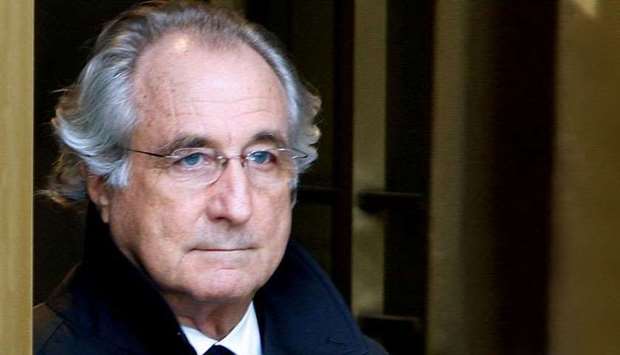Bernie Madoff, the mastermind behind the largest financial scam in history that unravelled during the 2008 economic crisis, died in jail yesterday, US prison officials said. He was 82.
Madoff had been suffering from chronic kidney failure and prison chiefs had denied his request last year to be allowed to go home to die.
The New Yorker was sentenced to 150 years in prison in 2009 for running a pyramid-style scheme that conned tens of thousands of people around the world and was estimated to be worth almost $65 billion.
It became an ugly symbol of Wall Street excess and left a crippling human toll, with investors going from rich to broke overnight.
“We can confirm Bernard Madoff passed away on April 14, 2021, at the Federal Medical Center (FMC) Butner, North Carolina,” an official with the federal Bureau of Prisons told AFP in an e-mail.
The statement said the cause of death needed to be determined by a medical examiner.
In February 2020, Madoff’s lawyer said the disgraced Wall Street financier was terminally ill with “kidney disease, among other serious medical conditions.”
“The Bureau of Prisons concluded in September 2019 that Madoff has less than 18 months to live because of the terminal nature of his kidney failure,” attorney Brandon Sample wrote.
He asked for compassionate release so he could mend fences with his grandchildren and die a free man but the request was rejected by the prisons bureau.
The Washington Post reported then that Madoff needed a wheelchair and 24-hour care.
“I’ve served 11 years already, and, quite frankly, I’ve suffered through it,” Madoff told the paper in an interview.
“You know, there hasn’t been a day in prison that I haven’t felt the guilt for the pain I caused on the victims and for my family,” he said.
In a city famous for money and theatre, the silver-haired Wall Street doyen was a master of both, using his charm to wheedle billions from his clients who little suspected he was a con artist.
Madoff was born on April 29, 1938 to Jewish parents, in humble beginnings in Queens, New York.
He started as a Long Island lifeguard before entering the stock market, eventually becoming chairman of the Nasdaq stock exchange.
There, he was credited with helping revolutionise the shift in trading from face-to-face deals, from telephones to computers, with trades made in seconds not minutes, and ushering in an era of ever greater stakes and profits.
But it was as a private money manager that he won a reputation as a financial guru.
Returns of around 10%, with occasional surges a great deal higher, came in so regularly that rich individuals, endowments, and supposedly expert banks lined up to give him money between the 1970s and 2000s.

Bernard Madoff (Reuters)


